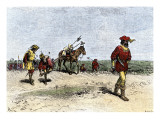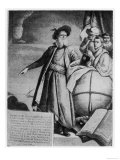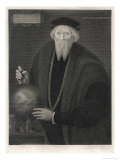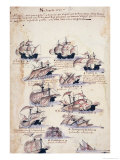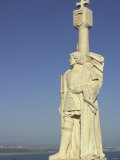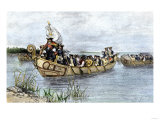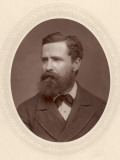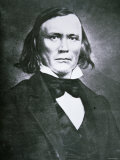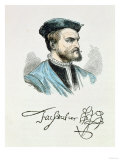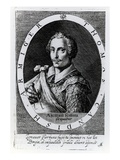|
|
|
|
|
Álvar Núñez Cabeza de Vaca
b. c. 1500; Jerez de la Frontera, Cadiz, Spain
d. c. 1557; Seville, Spain
Cabeza de Vaca was a Spanish explorer remembered for his La Relacion (The Report) to Charles V about being one of four survivors out of a party of 300, and crossing from Florida to Mexico, 1528-1537.
|
|
|
|
|
|
|
|
|
|
Pedro Alvares Cabral
b. c. 1467; Belmonte, Portugal
d. 1520; Santarém, Portugal
Pedro Alvares Cabral is considered the discoverer of Brazil. He was originally sent to establish trade relations with India, following the sea route of Vasco da Gama. However Cabral sailed further west, either by accident or intentionally, making contact with a large land mass that he claimed for Portugal.
• Voyage of Pedro Alvares Cabral to Brazil and India
|
|
|
|
Juan Rodriguez Cabrillo
b. ca. 3-13-1499; Portugal, possibly Seville, Spain
d. 1-3-1543; Santa Catalina or San Miguel Island, CA
Portuguese explorer Juan Rodriguez Cabrillo is noted for his exploration of the west coast of North America on behalf of Spain. He was the first European explorer to navigate the coast of present day California and many parks, schools, buildings and streets bear his name.
|
|
|
|
Antoine Laumet de La Mothe, sieur de Cadillac
b. 3-5-1658; Saint-Nicolas-de-la-Grave, France
d. 10-16-1730; Castelsarrasin
Known simply as Cadillac today, explorer and adventurer Antoine Laumet de La Mothe assumed the title, sieur meaning “sire”, of a town near his birthplace, after he arrived in the New World.
Cadillac was granted a seigniory (estate) at what was to become Bar Harbor, Maine; served as commandant of the fort at Michilimackinac, where his governance was described as “venal corruption which had reduced the most sensitive post in French America to a dram shop and brothel”; helped found Fort Pontchartrain du Détroit in 1701 where his adminstration was accused of extorting fees and services; served as govenor of Louisiana; and has his name emblazoned on an auto company.
FYI ~ Pontchartrain, a French politician, also had Lake Pontchartrain in Louisiana named after him.
• The Upper Country: French Enterprise in the Colonial Great Lakes
|
|
|
|
Verney Lovett Cameron
b. 7-1-1844; Radipole, near Weymouth, Dorset, England
d. 3-24-1894; England (fall from a horse)
Verney Lovett Cameron was the first European to cross equatorial Africa from sea to sea. He is also remembered for recovering Dr. David Livingstone's papers and returned them to England, a visit to the Euphrates Valley in the late 1870s, and as a co-author with Sir Richard Burton on To the Gold Coast for Gold describing their journey in 1882.
• Across Africa by Verney Lovett Cameron
|
|
|
|
Christopher Houston “Kit” Carson
b. 12-24-1809; Madison Co., Kentucky
d. 5-23-1868; Fort Lyon, Colorado (buried Taos, NM)
“Kit” Carson was an American frontiersman born to a Reveloutionary War veteran. At the age of two his family travelled to Franklin, Missouri, situated at the eastern end of the Santa Fe Trail.
After his father's untimely death clearing land purchased from Daniel Boone's sons, Carson apprenticed in a saddlemaker shop and heard the stories of the trader's and trappers setting out for New Mexico.
He left home at the age of 16, eventually learned the fur trapping skills and became fluent in Spanish, Navajo, Apache, Cheyenne, Arapaho, Paiute, Shoshone, and Ute. Carson also married three times, having fifteen children, and serving as scout for John C. Fremont.
• Kit Carson's Own Story of His Life
|
|
|
|
Jacques Cartier
b. 12-31-1491; France
d. 9-1-1557; France
France based its claims to the rich lands of Canada on the exploration of Jacques Cartier. He lead the first European expedition up the St. Lawrence River, which became an important passageway into the interior of North America. He detailed accounts of his geographical discoveries, the Indians, and the plants and animals of the New World were published in French, English, and Italian. They stimulated many later voyages to North America.
In 1534, King Francis I sent Cartier to North America to search for the fabled Northwest Passage to China. Many Europeans hoped they could reach the Orient by sailing north of North America. Cartier's expedition landed on the Gaspé Peninsula in Canada. He claimed the peninsula for France. There he met a group of Iroquois Indians who told him of precious jewels and metals farther northwest, which whetted his appetite for exploration. Cartier established friendly relations with the Indians on this expedition, finding natives who would later serve as interpreters.
Cartier returned to Canada the next year. Sailing along the northern coast of the Gaspé Peninsula, he entered a bay, which he named for St. Lawrence because the expedition arrived there on the saint's freat day. From the bay, he sailed up the great river to the foot of a mountain he called Mont Réal, or “Mount Royal.” The city of Montreal was founded on this site. Because Cartier claimed the region for France, Montreal grew into the second-largest French-speaking city in the world. ...
Winter stopped Cartier's exploration on this second expedition. He and his crew returnd down the river to what is now Quebec City, where their ships were trapped by ice and they had to spend the winter. The Frenchmen suffered greatly from cold and hunger during the long Canadian winter. Most of them became ill with scurvy, a disease caused by lack of vitamin C. Before Cartier learned that a brew of white cedar bark would cure the disease, 25 men died.
On his third voyage to America, Cartier searched for gold and spices that Indians said existed to the west. The Indians became hostile when they realized the French intended to stay in Canada. They killed many of Cartier's men, and he returned to France after spending another hard winter in Canada. (text from no longer available poster in series)
|
|
|
|
Thomas Cavendish
b. 9-19-1560; Trimley St. Martin near Ipswich, Suffolk, England
d. May, 1592; at sea
Sir Thomas Cavendish, known as “The Navigator” was an explorer and privateer, mimicing Sir Frances Drake. His first voyage was a successful and profitable circumnavigation of the globe with the capture of the Spanish galleon Santa Ana off the coast of Baja California. When Cavendish made it back to London, his ship, the Desire, was paraded on the Thames with new sails of blue damask from the booty.
Cavendish died on his second expedition.
FYi ~ In taking the Spanish treasure ship he set its crew, including Sebastián Vizcaíno, ashore where they had access to food and water.
|
|
|
previous page | top | next
history > exploring > Great Explorers List | a | b | CA > Ch-Cr | d
| e | f | g | h | i-j-k | l | m | n-o | p | q-r | s | t-u | v | w-x-y-z < social studies
|
|
I have searched the web for visual, text, and manipulative curriculum support materials - teaching posters, art prints, maps, charts, calendars, books and educational toys featuring famous people, places and events - to help teachers optimize their valuable time and budget.
Browsing the subject areas at NetPosterWorks.com is a learning experience where educators can plan context rich environments while comparing prices, special discounts, framing options and shipping from educational resources.
Thank you for starting your search for inspirational, motivational, and educational posters and learning materials at NetPosterWorks.com. If you need help please contact us.
|
|
|












